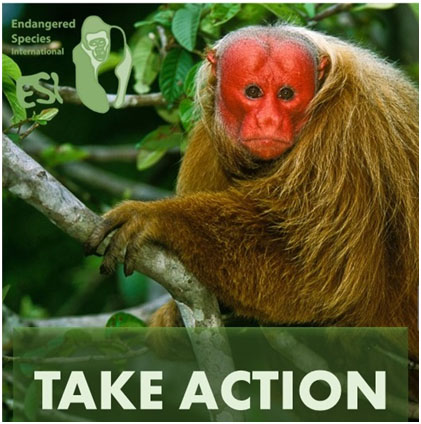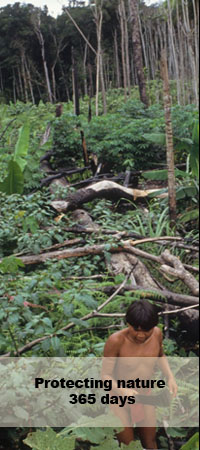|
We are looking for 200 people who will care for the Earth by making a monthly gift to Endangered Species International in honor of Indigenous Tribes who have been working with us to protect endangered wildlife and rainforests for the last 16 years! Together we are making sustainable, effective and long-lasting impacts to help and restore wildlife and wilderness.
Extinctions skyrocketed worldwide with the onset of the Industrial Revolution, especially since World War II, when resource extraction and consumption rates soared, and the planet saw exponential growth in human population to 8 billion by 2022. A new study evaluating the conservation status of 71,000 animal species globally has shown that 48% of species are decreasing, 49% remain stable, and just 3% are rising. Extinction rates for amphibians are higher than for all other vertebrates combined. The disappearance of colorful Harlequin frog species, which prefer Latin America’s forested mountains, is among the most alarming: 70% are critically endangered or extinct. Most wildlife losses are concentrated in the tropics where we work. The major cause behind this current crisis is habitat destruction, therefore, our work in restoring and protection wild habitats is more crucial than ever. Indigenous tribes and local communities are our best field partners to achieve amazing conservation impacts like creating 100,000 hectares (247,000 acres) of protected area conserving rainforest or protecting 240 endangered species directly in the field.
Why we focus our work in the tropics?
The tropics remain the extinction epicenter, and climate change could continue accelerating declines. Some research suggests that since temperatures remain relatively constant near the equator year-round, animals there may be physiologically more vulnerable to slight changes in temperature compared to those living in temperate zones, where wildlife adapts to wide winter-summer variations.
Nowhere are effective protected areas more essential than in tropical regions, which host a disproportionately large share of the world’s biodiversity and face rapid habitat loss and degradation, both major threats to biodiversity and vital home of indigenous people.
To date, humans have transformed more than three-quarters of the Earth. At least one million species are at risk of going extinct. At least 21% of the net global greenhouse gas emissions are associated with land-use change. We need to safeguard nature’s last remaining strongholds—the most important and intact wild landscapes and seascapes, which provide habitat for half the biodiversity on our planet, host the world's largest wildlife aggregations, and are essential to our own well-being. Giving monthly is an easy, effective way to protect our planet 365 days a year with one of the most effective animal and environmental charity!


|











